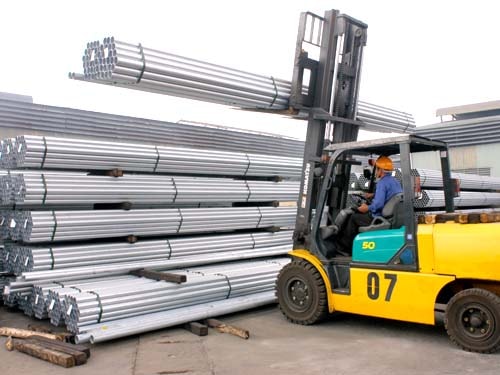Vietnam does not dump steel pipes into the United States
Vietnam's steel exports have been sued by the United States for anti-dumping four times. However, through investigations, the US Department of Commerce had to admit: Vietnam's major steel pipe exporting enterprises did not dump their products into the US market.
 |
Vietnamese steel pipes have been sued for dumping four times in the United States.
4 times sued for anti-dumping
According to the Competition Management Department (Ministry of Industry and Trade), on July 1, 2013, 9 domestic manufacturing enterprises of the United States submitted applications to the United States International Trade Commission (USITC) and the United States Department of Commerce (DOC) requesting the application of anti-dumping and anti-subsidy measures on oil pipelines imported from Vietnam.
This is the fourth anti-dumping lawsuit of the United States against Vietnam's steel exports since 2011. The steel products previously investigated for anti-dumping by Vietnam were carbon welded steel pipes, stainless steel pressure pipes and steel coat hangers.
According to figures in the US complaint on the import of this item, in 2012, the import turnover from Vietnam reached about 184 million USD, with a total volume of 196,415 tons, accounting for 12% of the import market share into the US.
Carbon steel welded pipes are used in the manufacturing and interior decoration industry, with an import tax rate of 0% to the US. According to customs data, the amount of steel exported from Vietnam to the US market has recently increased, combined with a relatively low selling price, causing partner countries to consider suing to protect domestic production.
Previously, in 2012, Allied Tube and Conduit (IL), JMC Steel Group (IL), Wheatland Tube (PA) and United States Steel Corporation (PA) filed a lawsuit with DOC against 14 product codes of carbon steel welded pipes and tubes imported into the United States by Vietnamese companies.
DOC conducted an investigation and on October 16, 2012 announced the final decision in the anti-subsidy investigation (CVD) on steel pipes imported from Vietnam, ending the anti-subsidy investigation on steel pipes imported from Vietnam.
In this decision, DOC affirmed that none of the two mandatory defendants, SeAH Steel VINA and Hong Nguyen Machinery Manufacturing Company (Hai Phong), received subsidies from the government under the programs alleged by the plaintiff. Therefore, there is no countervailing subsidy for Vietnamese carbon steel welded pipe manufacturers and exporters.
| According to economic experts, enterprises need to actively and proactively participate in appeals, because if enterprises do not fully cooperate with the investigation agency, available information will be used to their disadvantage. As a result, enterprises will be subject to a very high final tax rate compared to enterprises that participate and cooperate fully. |
Businesses need to proactively participate in lawsuits.
Faced with the US imposing anti-dumping and anti-subsidy tariffs on carbon steel welded pipes from Vietnam, businesses need to proactively cooperate with each other to participate in the lawsuit, in order to avoid creating an unfavorable precedent. Solidarity and unified action among businesses, especially large businesses selected as mandatory defendants, is essential to achieve the best final result for the entire industry.
According to US regulations, only a few enterprises are selected as mandatory defendants and are charged with separate tax rates. The tax rates of the remaining enterprises will be calculated based on the tax rates of those selected as mandatory defendants. Therefore, enterprises need to coordinate with each other in both direction and material resources to ensure benefits for all enterprises.
Enterprises also need to coordinate closely with competent state agencies. Although the final result of an anti-subsidy lawsuit has a direct impact on enterprises, the role of the state in the appeal process is very important because the state is the entity providing the investigated forms of subsidies. Therefore, enterprises need to coordinate with the state to provide information in a unified and beneficial manner.
In addition to enterprises with the largest export volume of investigated products to the United States, which are likely to be selected as mandatory defendants, the remaining enterprises should participate in the lawsuit as voluntary defendants by submitting self-introduction information to the investigation agency and answering the investigation questionnaire.
In addition, there must be close and effective cooperation between state agencies from central to local levels with consulting lawyers throughout the process of drafting and completing responses, providing all necessary supporting documents from the Vietnamese Government to send to DOC in accordance with the anti-subsidy law requirements of the host country.
According to baocongthuong






